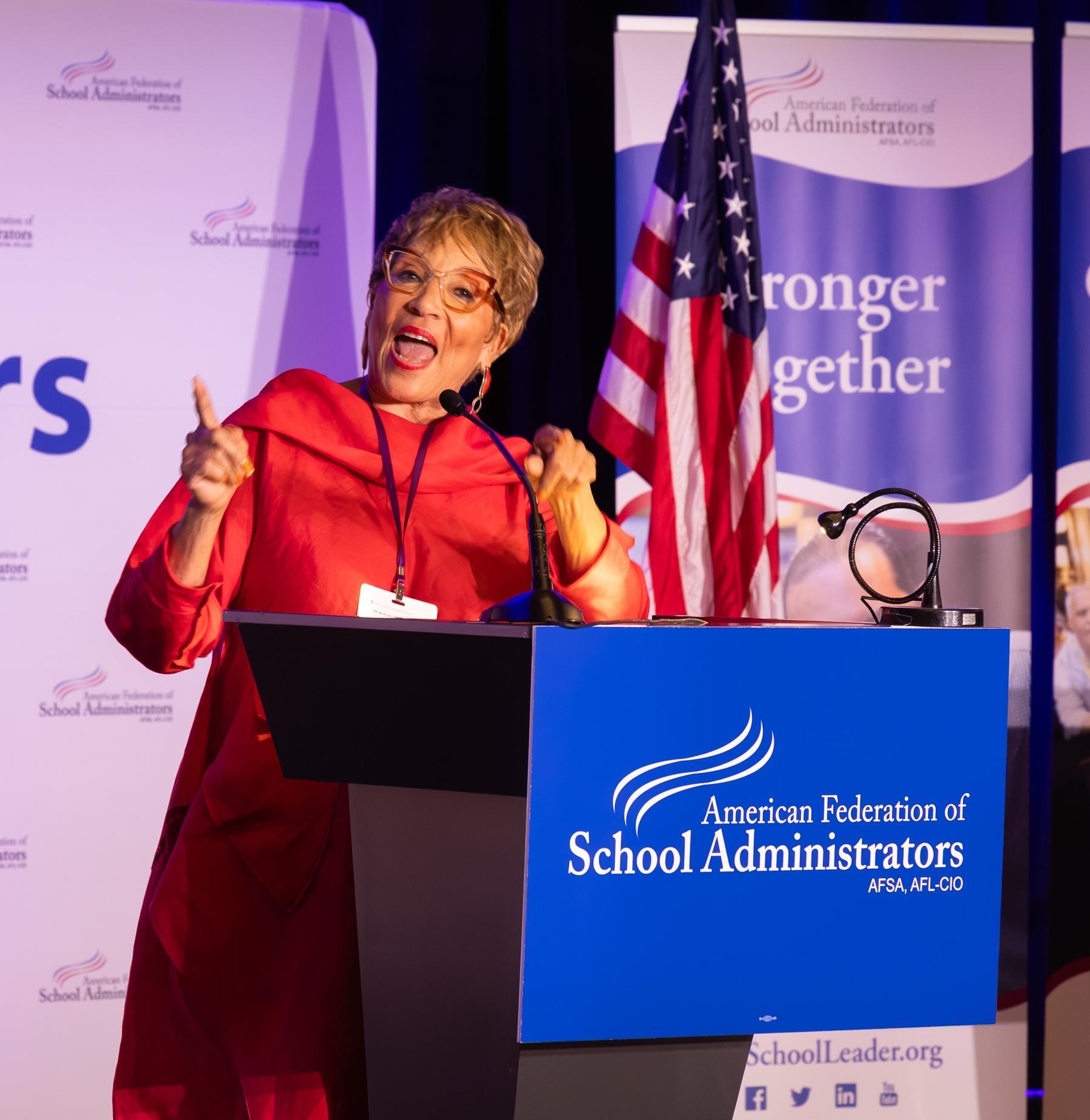Poet laureate, York College professor and professional developer Lindamichelle Baron lit up the 17th Triennial Convention, delivering remarks that mixed humor, rhythm, poetry and candid personal storytelling.
Known as the self-described “Beyoncé of education,” Baron reminded school leaders of the profound impact they hold in shaping children’s lives—and the communities they serve.
“I’m trying to become a better me so I can be part of a better ‘we,’” Baron told the audience. “That’s what this is about—bringing our gifts to the table so together we can lift our children and each other.”
From the moment she took the stage, Baron’s energy was palpable. She immediately turned the audience into her “amen corner,” a nod to the call-and-response tradition of Black churches. “One of my students called me the Beyoncé of education….I think he wanted an A,” she said, prompting laughter. “I don’t care. I’m not all that. But I do a little—it’s not a rap, it’s my signature thing.”
Baron invited the audience into her performance, leading them through a short poem about starting each day with purpose:
"Come watching you. This is the way. We start that day.
We get the knowledge to go to college. We won’t stop there.
Oh, anyway, work and smile, because that’s our style.
We love each other, help one another, there’s nothing to it, just got to do it.
This is the way we start the day."
Audience members echoed “Hey!” and “Amen!” after each line, creating a sense of collective energy and participation. “We energize each other,” Baron said. “It’s about us, not just me.”
Baron’s poetry gave voice to “that child”—the talkative, challenging, sometimes defiant student every educator has known. She recounted her own experiences as a child who tested limits, pushed boundaries, and later as a teacher connecting with students in alternative education settings. “If we don’t talk to them, we are done,” she said. “We can’t be judge and jury. We have to be the support system. They are all we’ve got.”
Delegates said her message resonated deeply. “Her words reminded me why I became a principal,” said one New York City delegate. Another from Chicago added, “She reminded us that our schools have to be safe havens, and that what we do every day really matters for every child we serve.”
Baron’s poetry celebrated self-love, resilience and cultural pride. In "I’m Becoming a Better Me," she embraced aging and authenticity with humor and confidence:
"My cellulite can crack and crinkle, my body can be one big wrinkle, but I walk my talk with every move… I’m becoming a better, better, more awesome me."
She shared a personal mantra inspired by her mother: “Dress in love. That’s how we have to dress our children. We have to dress our teachers, our colleagues and our communities in love. Even when they don’t know it, we can show it. That’s ministry.”
Baron’s poetry also celebrated divine design and the inherent worth of every child. In another piece, she affirmed Black identity and individuality:
"I don’t want to hide or change my color. I believe there’s a Creator above who especially chose this tint and poured it all over me with love. He used His foolish paintbrush to add the details of my features. We are masterpieces handled with care, irreplaceable works of His art."
She encouraged school leaders to see beyond the exterior, reminding them that every child carries brilliance and potential, even if surrounded by misunderstanding or low expectations. “We have to talk to them—not at them—but with them,” she said. “We are here in support of them. We are collectively here to support that child. If we don’t do that for them, these other forces win.”
Baron wove in humor, rhythm and moments of theatricality, recounting the call-and-response, the interactive exercises and her own playful self-deprecations. She described herself as “that child” who knew how to push buttons and tested every boundary—and later as the teacher who met those children with poetry, patience and love.
Her closing poem, "You’re Just Too Much," celebrated the educators themselves:
"I could add this and that, metaphors and similes, still I can’t capture all of you… You are just too much."
Closing on a note of affirmation and gratitude, Baron saluted the resilience of school leaders who continue to fight for children and communities. “Always remember—school leaders are the guardians of hope and the defenders of opportunity,” she said. “When we lead with vision and act with purpose, there is nothing we cannot achieve.”
